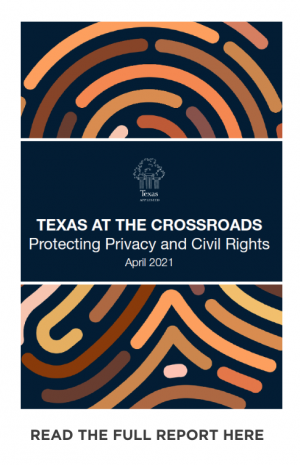
Texas at the Crossroads: Protecting Privacy and Civil Rights
The absence of a robust, uniform approach to data privacy in the US is highlighted by news stories and first-hand accountsdetailing the fallout of the collection, use, and sale of a wide range of personal data. The use of this personal data is alwaysintrusive and often discriminatory, resulting in a host of inequities and abuses based on factors such as race, gender, sexualorientation, demographics and biometrics, political opinions, health status, geolocation, browsing habits, social networks,tagged photos, and a multitude of other indicia.

The situation in Texas mirrors that of the US as a whole.
Increasing access to and use of technology for communications and commerce is fueling debates as to a proper courseof action: stem the tide or watch as the tsunami erodes the privacy and civil rights so fundamental to our democraticunderpinning. While this struggle at the intersection of privacy and civil rights is not new, recent events have laid bare theegregious exploitation of personal data.
While the US has a smattering of lackluster and generally unenforced privacy statutes, some states, including Texas, areconsidering or taking steps to protect the personal information of their citizens. In the 2019 legislative session, the TexasLegislature established the Texas Privacy Protection Advisory Council to study data privacy laws in Texas, other states,and relevant foreign jurisdictions. The Council issued a report in September 2020, with general recommendations for futureproposed privacy legislation. In the 2021 session, bills have been introduced to protect personal data held by public andprivate entities.
How does the lack of privacy protection impact Texans?
Data collected by companies is used to influence consumer behavior, control access to opportunities, and impose financialburdens on all of us — including those most vulnerable to this digital sleight of hand. Real-time bidding in advertising, predatoryloan pricing, resume-sorting, and facial recognition are just some of the ways your data can be used against you.
What’s wrong with existing laws? They are widely recognized as obsolete and seldom enforced.
How can Texas do its part to remedy the situation? We recommend a three-pronged approach: legislation, rulemaking, andenforcement. First, pass a state privacy bill that clearly defines rights for consumers as well as requirements for businesses,embedding civil rights protection directly into the bill. Second, bring citizens, companies, and the state to the table to developeffective regulations. Third, demand vigorous enforcement.
Texas can and should implement meaningful privacy protections.
SB 16 prohibits the disclosure of personal data by the state of Texas. HB 3741 gives Texas residents the right to know,access, and delete their personal information, as well as the right to correct inaccurate information. While each of thesemeasures could be improved, the basic principles of ensuring data control and privacy for Texans are important.
HB 3741 is a step in the right direction, requiring companies to specify — before any information is gathered — what data iscollected, how the data is processed, and who has access to the data. We do recommend three additions:
- Allow consumers to opt out of the sale of their data to third parties,
- Forbid companies from retaliatory measures when citizens exercise their privacy rights, and
- Include a strong statement that protected class variables not be used to discriminate against Texans.
As the Texas Privacy Protection Advisory Council declared last year, “Texans have the right to know how their personalinformation is being used and the Legislature should consider ways to strengthen that right.” It is time for the legislature toprioritize privacy and civil rights.
Steve Perkinsis former Associate Dean of Graduate Programs in the School of Management at the University of Texas at Dallas and a Certified Information Privacy Professional.Ann Baddour is the Director of the Fair Financial Services project at Texas Appleseed.